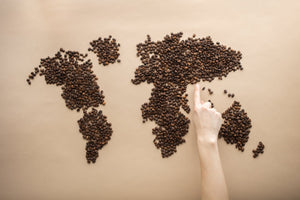Most people who get their coffee from a coffee shop or buy instant coffee are unaware of the fact that there are several types of coffee beans, grown in certain regions and controlled conditions, that influence the taste, strength and aroma of coffee. If you are a coffee lover, who wishes to learn more about their coffee and where it comes from, this is the perfect article for you. After reading this detailed article of the different types of coffee beans, you can make an informed decision the next time you buy your coffee beans.
There are mainly four types of coffee beans, including Arabica, Robusta, Excelsa and Liberica, all having their unique taste profiles and aromas. Let’s see how each of these differ in characteristics and production.
Arabica
Arabica is perhaps the most popular and widely used coffee. Most people prefer Arabica coffee beans because they have heard about it before. This is also because Arabica coffee beans are the most widely produced coffee beans, having a variety of flavor options and superior quality. Statistics show that around 60% of all the coffee beans produced around the globe are of the Arabica variety. What makes this type of coffee special is that it is grown at high altitudes that witness high and steady levels of rainfall as well as plenty of shade.
The popularity of these coffee beans is owed to their easy production, as compared with other types of coffee beans. The trees are easier to grow and take care of because they are small and not the hardest plant to prune, moving most coffee farmers towards growing Arabica coffee. Despite their delicate nature, Arabica plants can be easily affected by environmental conditions, requiring steady temperatures and rainfall.
Arabica coffee is known for being extremely flavorful and aromatic, making it a favorite among most coffee drinkers.
Robusta
The second most widely produced coffee type is Robusta. This is also a fairly known and used coffee bean type, served in most coffee shops. The name Robusta indicates that these coffee beans are of excellent quality, with the term Robusta directly translating into robust or hardy. These coffee beans are immune to a variety of diseases, proving to be a great choice!
Robusta coffee beans require hot climates, with sporadic and irregular rain to grow. They can also be grown at different altitudes, making them easier to grow in a number of regions. The harvest conditions of this coffee mean that the properties will be different from Arabica.
Robusta plants have twice the ratio of caffeine in them, making Robusta coffee extremely strong and rich. It also has a comparatively harsher flavor, giving you the perfect caffeine kick you need to start your day! Another excellent characteristic of Robusta coffee beans is that they have a smooth texture and a chocolaty flavor, making them perfect for lattes and cappuccinos, as well as cold coffees.
Excelsa
Excelsa coffee beans are quite similar to Liberica in certain aspects, which is why they have recently been classified as an extension of the Liberica family of coffee. However, the flavors of Excelsa coffee greatly differ from that of Liberica.
This unique and resilient coffee is also quite rare and difficult to find, unlike Arabica and Robusta. Even though it is popularly grown in Africa and some parts of Asia, it remains uncommon in the rest of the world. Therefore, the cultivation and roasting process of these coffee beans is largely misunderstood. However, the unique flavors of Excelsa coffee beans can be enjoyed if an expert prepares your coffee!
Liberica
Liberica coffee beans are perhaps the most unique and difficult to source. These coffee beans are noticeably harder than other types. Another unique feature is the irregular shape that distinguishes them from other types of coffee beans. The best thing about Liberica coffee beans is their distinctive aroma, with tinges of smoky, fruity and flowery scents.
Conclusion
Now that you know about the different types of coffee beans and where they come from, you have enough coffee knowledge to use in a great ice breaker conversation! You can learn more about coffee production, organically grown options and sustainable coffee sourcing to be a conscious and environmentally friendly coffee consumer!

